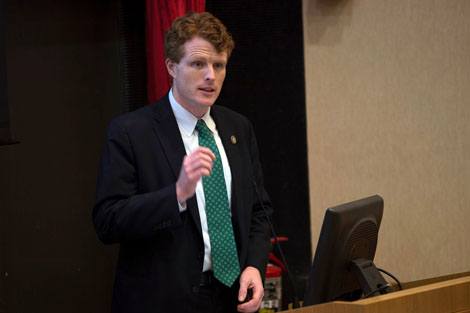March 7, 2017— Some 30 million Americans suffer from an eating disorder during their lifetime, and far too few receive the care that they need. Stigma can be a barrier to treatment—as can insurance hurdles that make it far more difficult to receive consistent, affordable care for a child with an eating disorder than, for example, one with asthma.
Advocates for eating disorders prevention gathered at Harvard T.H. Chan School of Public Health for a panel discussion on these issues, and how federal and state mental health policy may be affected by the Trump administration.

Held February 23, 2017 in Kresge G-3, the event was co-sponsored by the STRIPED (Strategic Training Initiative for the Prevention of Eating Disorders) program based at Harvard Chan School and Boston Children’s Hospital, the Eating Disorders Coalition, Harvard Chan Mental Health Student Alliance, and the Department of Social and Behavioral Sciences at Harvard Chan School. Watch event video
Representative Joseph Kennedy (D-Mass.) spoke at the event about his support for mental health parity legislation, which requires insurance companies to provide the same level of benefits for mental health and addiction treatment that they do for medical care. He called for greater transparency from insurance companies around coverage denials, and for protecting and expanding the Affordable Care Act (ACA)—which required that plans offered on the Health Insurance Marketplace cover many behavioral health treatments and services.
Kennedy supported the 21st Century Cures Act, signed by President Obama shortly before he left office, which included clarification of existing mental health parity law to improve health insurance coverage for eating disorders, and also promoted training and resources around eating disorder identification and prevention.
Urging audience members to advocate on behalf of mental health parity, Kennedy expressed his hope of ultimately achieving a health care system “where we treat depression in the same way as a broken leg, and addiction with the urgency of a heart attack.”
Also speaking at the event, Matt Selig of Health Law Advocates, a law firm that provides pro bono representation for people experiencing difficulty accessing or paying for medical services, said that while current federal and state mental health parity laws are strong, more work is needed around enforcement. Not all insurance plans are in compliance, he said.
Selig said that he has heard no warnings that the 21st Century Cures Act is at risk. But if the ACA is repealed, he said, individual plans may lose parity requirements and people may lose coverage.
Other speakers at the event included Anne Becker of Harvard Medical School, Sara Forman of Boston Children’s Hospital, and Stacey Sacks, the mother of a teenage girl with an eating disorder. All three discussed the difficulties faced by families of loved ones with eating disorders.
Moderator Bryn Austin, director of STRIPED and professor in the Department of Social and Behavioral Sciences, asked Sacks what public health efforts might have helped prevent her daughter’s eating disorder. Sacks said that she would have benefitted from information on identifying the early signs of eating disorders—which, in retrospect, she said were apparent as early as third grade with her daughter—and help addressing the stigma around eating disorders, which Sacks said kept her in denial about her daughter’s health for too long.
Photos by Sarah Sholes
